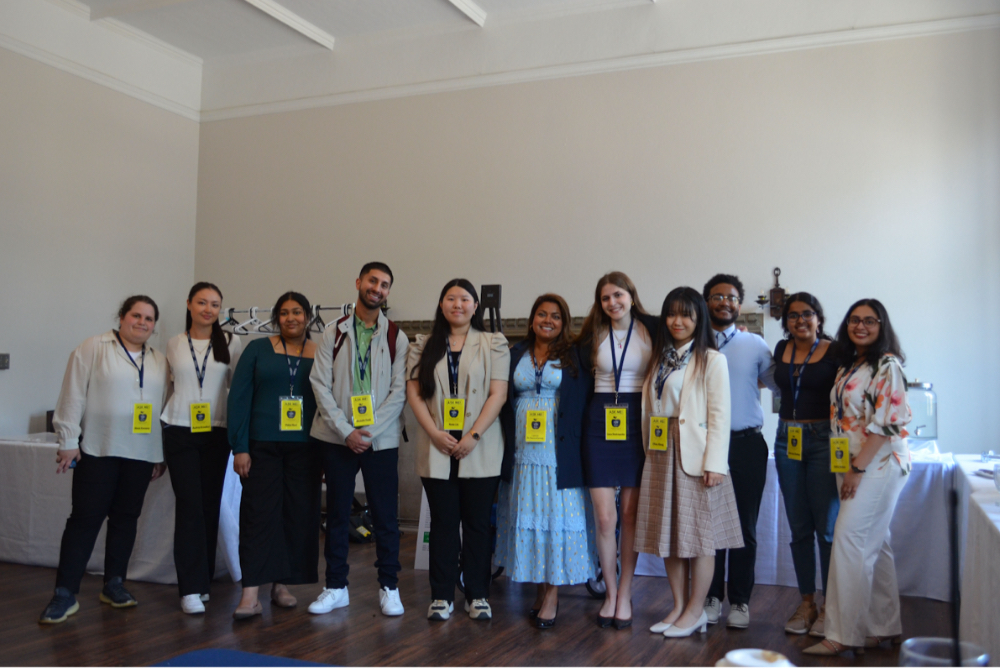Nutrition and Food Literacy Canada to host meeting at U of T’s Hart House discussing health equity and nutrition
Founder Dr. Leanne De Souza-Kenney explains why younger groups need to be aware of social justice and social determinants of health in their communities.
This March, the education initiative Nutrition and Food Literacy Canada will host a junior meeting with racialized elementary school students at the University of Toronto’s Hart House to discuss health equity, nutrition, and food literacy in Canada. The Medium spoke with the initiative’s founder, Dr. Leanne De Souza-Kenney, to gain further insight into what this meeting hopes to accomplish.
Dr. De Souza-Kenney is an assistant professor of global and public health in the human biology and health studies programs at U of T and is cross-appointed to the Factor-Inwentash Faculty of Social Work at the university. “My mission is to bring people along with me on this journey—individuals who are passionate, groups of people, and other organizations [who] work toward food justice and health equity,” stated Dr. De Souza-Kenney.
Nutrition and Food Literacy Canada first started in Memphis, Tennessee, where Dr. De Souza-Kenney examined how American cultural structures and systems impact generational health in the American South. Dr. De Souza-Kenney extended her work to Canada, where she was awarded the Fulbright Community Partnership Alumni Grant to continue the work she first started in Memphis.
“My goal was to leverage those systems that impart structural, social, and cultural impacts on society, such that we can work together to use their resources, strengths, and incredible human talent, to forge a massive cultural paradigm shift for Canadians,” Dr. De Souza-Kenney stated.
Dr. De Souza-Kenney emphasizes that access to knowledge plays a key role in people understanding and changing their social circumstances. According to her, “You don’t always know what you don’t know, and that means you don’t necessarily know what and how to ask for what you need when you have never truly [experienced] having what you needed. Get your head around that one.”
According to De Souza-Kenney, Nutrition and Food Literacy Canada is the first national initiative that unites partners across different backgrounds to implement their dual-purpose vision. The first part of their vision is the co-creation of an “interwoven” curriculum for kindergarten to grade 12 (K-12) students on nutrition and food literacy. The curriculum would be woven through existing subjects in the current curriculum and offer in-service teacher training. It will consist of recorded modules, lesson plans, and assessments to support students’ learning of fundamental nutrition and food literacy concepts.
Secondly, the initiative calls for the co-creation of a teacher’s certificate in nutrition and food literacy. The certification would entail completing a set of modules, that, according to Dr. De Souza-Kenney, would be “concise yet robust across all Canadian Teachers’ Colleges.” The goal is to empower and equip teachers with the required knowledge to teach nutrition and food literacy topics to students.
To date, Canada does not offer a robust curriculum in nutrition and food in K-12 education. Dr. De Souza-Kenney argues that it is critical for Canadians to have access to information on eating well, preparing food, and how food environments impact a person’s health.
This coming March, Nutrition and Food Literacy Canada is inviting a class of seventh-grade students from a school in the Greater Toronto Area to share what they want to see in a nutrition and food curriculum. This part of the project is in collaboration with the Joannah & Brian Lawson Center for Child Health and Nutrition at U of T—where Dr. De Souza-Kenney is the Alexander Lawson Distinguished Fellow in Child Health and Nutrition—and with the Equity, Diversity, and Inclusivity (EDI) Committee of U of T’s Human Biology Program where Dr. De Souza-Kenney serves as co-chair.
The event, which is called Sustainable Cities and Junior Charette, will address the barriers students face in their everyday lives that prevent them from optimizing their health.
“When we hold space for groups in our neighbourhoods to access the prestige of our institution, to use the physical spaces and ‘take up space,’ while also supporting authentic EDI conversations between elementary and university students, we begin to do the work of dismantling barriers to access in our cities—those that are both physical barriers as well as deeper systemic and psychological barriers,” Dr. De Souza-Kenney shared.
Currently, Dr. De Souza-Kenney is collaborating with the Dufferin Peel Catholic District School Board to map Ontario’s curriculum and identify gaps where nutrition and food literacy can be integrated into the existing curriculum. In the next stage of Dr. De Souza-Kenney’s work, she will help map the curriculums of other provinces to build opportunities to teach nutrition and food literacy across all schools in Canada. “They say it takes a village,” she concludes, “but in this case, it will take a country.”

